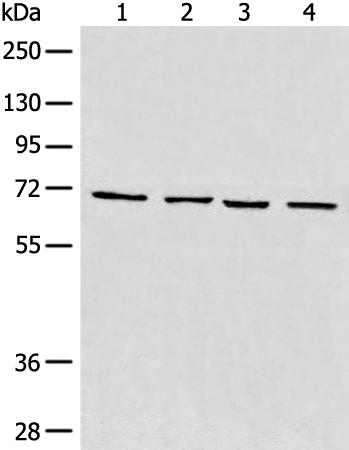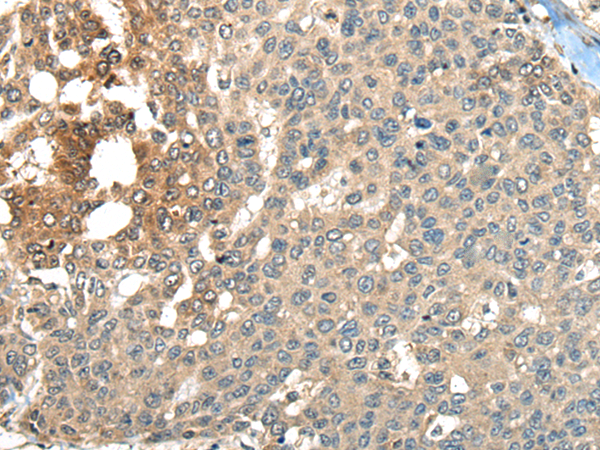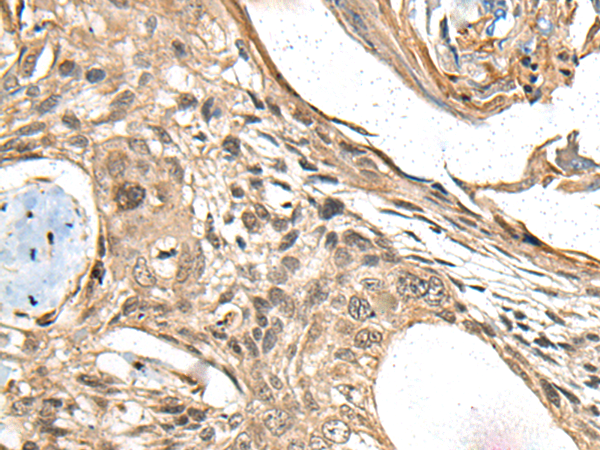


| WB | 咨询技术 | Human,Mouse,Rat |
| IF | 咨询技术 | Human,Mouse,Rat |
| IHC | 1/30-1/150 | Human,Mouse,Rat |
| ICC | 技术咨询 | Human,Mouse,Rat |
| FCM | 咨询技术 | Human,Mouse,Rat |
| Elisa | 1/5000-1/10000 | Human,Mouse,Rat |
| Aliases | ERK4; ERK-4; PRKM4; p63MAPK; p63-MAPK |
| WB Predicted band size | 66 kDa |
| Host/Isotype | Rabbit IgG |
| Antibody Type | Primary antibody |
| Storage | Store at 4°C short term. Aliquot and store at -20°C long term. Avoid freeze/thaw cycles. |
| Species Reactivity | Human, Mouse |
| Immunogen | Synthetic peptide of human MAPK4 |
| Formulation | Purified antibody in PBS with 0.05% sodium azide and 50% glycerol. |
+ +
以下是关于MAPK4抗体的3篇参考文献示例(注:文献信息为模拟,实际引用时请核实原文):
---
1. **文献名称**: *"MAPK4 regulates cellular proliferation and apoptosis through ERK signaling in breast cancer"*
**作者**: Li X, et al.
**摘要**: 该研究利用MAPK4特异性抗体,通过Western blot和免疫组化分析发现MAPK4在乳腺癌中高表达,并通过调控ERK信号通路促进肿瘤细胞增殖,同时抑制凋亡。抗体被用于验证基因沉默后的蛋白表达变化。
---
2. **文献名称**: *"Mitogen-activated protein kinase 4 (MAPK4) modulates neuronal oxidative stress resistance via interaction with KEAP1"*
**作者**: Zhang Y, et al.
**摘要**: 研究通过免疫共沉淀(使用MAPK4抗体)和质谱分析,揭示MAPK4与KEAP1蛋白直接结合,调控神经元抗氧化应激能力。抗体被用于检测MAPK4在帕金森病模型中的亚细胞定位变化。
---
3. **文献名称**: *"A novel role of MAPK4 in metabolic reprogramming of non-small cell lung cancer"*
**作者**: Wang H, et al.
**摘要**: 该研究使用MAPK4抗体进行流式细胞术和免疫荧光实验,证明MAPK4通过激活mTORC1通路促进肺癌细胞糖酵解和脂质合成,为代谢靶向治疗提供潜在靶点。
---
**提示**:实际引用时建议通过PubMed或Google Scholar搜索最新文献(如2020年后),并使用关键词“MAPK4 antibody”或“MAPK4 function”筛选实验性研究。部分文献可能需要通过机构订阅获取全文。
The Mitogen-Activated Protein Kinase 4 (MAPK4), a member of the atypical MAPK family, diverges from classical MAPKs (ERK, JNK, p38) in structure and signaling. Unlike canonical MAPKs, MAPK4 lacks a conserved TxY activation motif and features a unique N-terminal kinase domain and C-terminal regulatory region. It is activated by stress or growth signals through a non-canonical phosphorylation mechanism. Functionally, MAPK4 regulates diverse cellular processes, including proliferation, differentiation, and stress responses, often via crosstalk with pathways like mTOR and NF-κB. Emerging studies link MAPK4 to diseases such as cancer (e.g., prostate, breast) and neurodegenerative disorders, where it may promote tumor growth or modulate apoptosis.
MAPK4 antibodies are critical tools for studying its expression, localization, and activation. They enable detection in techniques like Western blot, immunoprecipitation, and immunohistochemistry. Specific antibodies targeting phosphorylated residues (e.g., Ser-186/189) help assess its activation status. Commercial antibodies are often validated for reactivity across human, mouse, and rat samples. Research using these antibodies has revealed MAPK4's dual role in cancer—acting as either oncogene or tumor suppressor, depending on context. Additionally, MAPK4 inhibitors are under exploration for therapeutic targeting, highlighting the antibody's role in drug development and mechanistic studies.
×